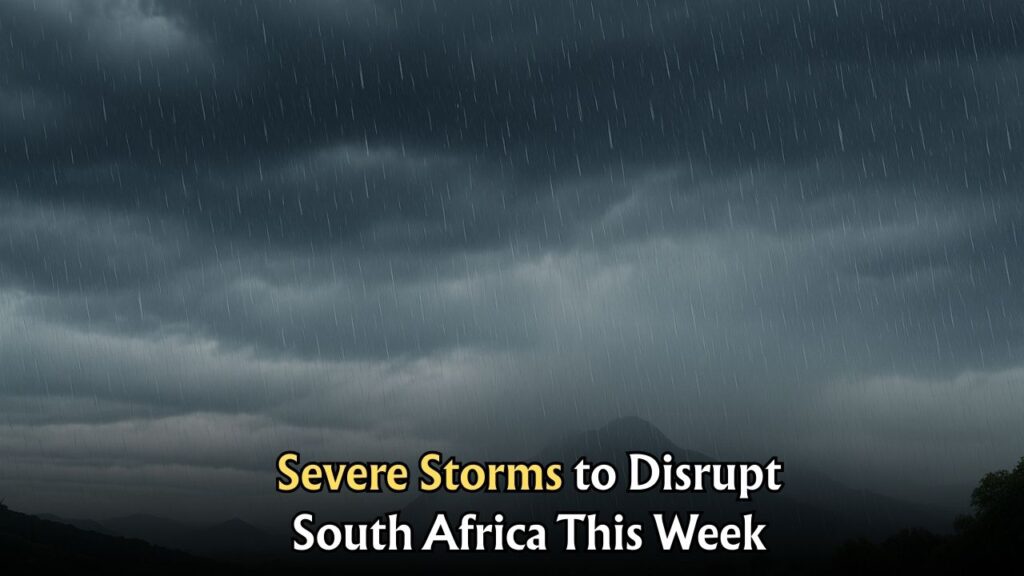South Africa’s Severe Storm Alert: As South Africa braces for severe weather conditions, citizens are urged to stay informed about the latest developments. The South African Weather Service has issued a stern warning, highlighting the potential dangers associated with the upcoming storm system. With forecasts predicting significant rainfall, local authorities are on high alert to mitigate the impact on communities across the nation. The weather patterns indicate an intense period of heavy rainfall, which could lead to flooding and disruptions in daily activities. Residents are advised to take necessary precautions and stay updated with official announcements from local meteorological services.

Heavy Rainfall Expected Across South Africa
The forecast for heavy rainfall has put many parts of South Africa on edge. Meteorologists have indicated that the storm system will bring substantial precipitation, particularly affecting the eastern and coastal regions. This influx of rain raises concerns about potential flooding, especially in low-lying areas and regions already saturated from previous weather events. Local municipalities are preparing to deploy resources such as sandbags and emergency services to assist affected communities. The heavy rains are expected to continue throughout the week, with the possibility of thunderstorms further exacerbating the situation. Communities are advised to secure their homes, clear drainage systems, and avoid unnecessary travel during peak rainfall periods. The persistence of these weather conditions underscores the importance of heeding warnings and following safety protocols to minimize risks to life and property.
Impact of Severe Storms on Local Communities
The severe storms set to hit South Africa could have a profound impact on local communities, particularly those in vulnerable areas. With heavy rainfall predicted, the risk of flash floods looms large, threatening homes, infrastructure, and livelihoods. In rural areas, where infrastructure is often less resilient, the consequences could be even more dire, leading to isolation and difficulty accessing essential services. Urban centers, while better equipped, are not immune to the challenges posed by such weather events. Traffic disruptions, power outages, and water supply issues are among the anticipated problems that residents must prepare for. Authorities are emphasizing the need for community readiness, encouraging citizens to have emergency kits prepared, stay connected with local news outlets, and collaborate with neighbors to ensure collective safety. As the storm approaches, it is crucial for all South Africans to remain vigilant and proactive in safeguarding their communities.
Preparations and Safety Measures for Upcoming Storms
In light of the severe weather alert, preparation is key to ensuring safety and reducing the impact of the storms. The government has advised residents to stay indoors as much as possible during the height of the storm and to avoid traveling unless absolutely necessary. Emergency services have been put on standby, ready to respond to any incidents that may arise. Individuals are encouraged to secure outdoor furniture, check the stability of structures on their property, and ensure that all emergency contact information is easily accessible. It’s also vital to have a supply of non-perishable food, water, and essential medications. For those living in flood-prone areas, having an evacuation plan is crucial. Families should discuss and practice their plans to ensure everyone knows what to do in an emergency. By taking these proactive steps, South Africans can better protect themselves and their loved ones from the potential dangers of the upcoming severe weather conditions.
Long-Term Implications of Severe Weather on South Africa’s Climate
The current severe weather alert is a stark reminder of the broader climate challenges facing South Africa. As extreme weather events become more frequent and intense, there are significant implications for both the environment and society. These events can lead to increased soil erosion, impacting agriculture and food security. Furthermore, the strain on infrastructure from repeated flooding can lead to long-term economic costs, requiring significant investment in repair and adaptation. The government, alongside scientific communities, is exploring sustainable solutions to mitigate the effects of climate change and improve resilience against future storms. Initiatives such as improved water management systems, reforestation projects, and community education programs are vital in adapting to the changing climate. As South Africa navigates these challenges, it is essential to foster a culture of awareness and innovation, ensuring that the nation is equipped to handle the evolving climate landscape.




